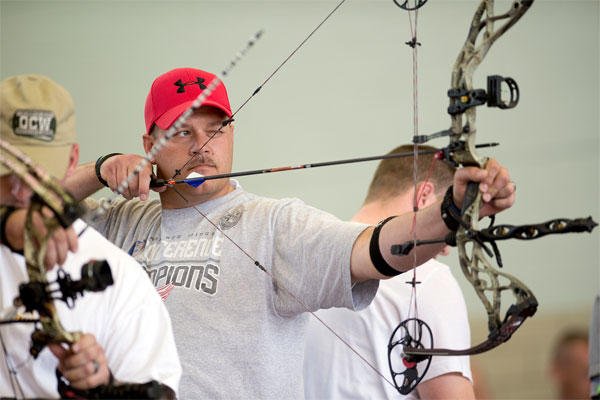EL PASO, Texas -- As the crowd applauded, the veteran dipped his head to receive his first gold medal, his eyes holding back tears, a slow grin creeping onto his face. Somebody yelled, "Hold hands," and he grabbed the hands of his fellow athletes and raised them in the air, celebrating his victory in rifle shooting with his fellow wounded warriors at the Army Trials here earlier this month.
"I won a gold medal," said Army Staff Sgt. Cory Davis, still in shock. "I didn't expect to win. They were cheering my name. It was the first time I ever won a gold medal. Now I have something I can take back to my kids."
While growing up in San Diego, Davis said, he always wanted to work on helicopters, and the Army gave him that chance. He enlisted in the active duty Army for nine years, took a break, and then became an avionics mechanic National Guard technician with the 1107th Theater Aviation Sustainment Maintenance Group in Springfield, Missouri. He's worked on helicopters for 15 years now, and said he loves it.
An Emotional Year
For Davis, this last year has been an emotional one.
During a deployment to Afghanistan in April 2014, Davis hurt his ankle and lost control of his right arm. He said the doctors thought it was the ulna nerve, and he was flown to Germany and then back to the United States. After performing several tests, the doctors realized he had Parkinson's disease, a progressive disorder of the nervous system that affects movement.
Davis said it's unusual for a 45-year-old to have the disease and that the diagnosis took him by surprise. But his wife, Dawn, has helped him through the stages of acknowledging and acceptance of having a disease, he said.
"It took me back a little bit, and now I'm just trying to live with the not knowing what's next," he added. "But Dawn, she's my resource, my rock. She pushes me to compete. She continues to challenge me. She's the one who's accepted the diagnosis. She's my biggest supporter."
Davis met his wife, a fellow National Guardsman, a few weeks before they deployed together to Afghanistan in 2010.
"But we fell in love with each other during the deployment and got married six months after we got back," Davis said with a smile. They were deployed for almost a year. He and Dawn have two daughters, Ashley and Sydney, two step-children, Trenton and Whitney, and four grandchildren, Hayden, Autumn, Kinley and Brooklynn. Dawn has been in the National Guard for six years and is a human resources administrator.
Tenacity and Perseverance
Dawn said her husband is her hero.
"Before my husband was deployed, he was a strong and healthy man. He came home with a life-altering condition with no cure," she said. "He has put forward great tenacity and perseverance in overcoming the symptoms he encounters each day. This makes me place him higher on the pedestal I thought he could never rise higher from.
"He is my hero, and I am filled with pride when he approaches each obstacle he faces every day," she continued. "His constant attitude of not giving up makes me so very proud and happy he is not allowing a terrible disease to control his life."
While Davis was recovering at the Warrior Transition Unit at Fort Leonard Wood, Missouri, his wife, along with Army Trials athlete Sgt. 1st Class Sam Goldenstein, the adaptive sports site coordinator there, encouraged him to give adaptive sports a try.
"I had been spending time in my room doing nothing, getting pretty depressed," Davis said. "Sam comes in and said, 'Cory, what do you want do? We've got archery, shooting, this, this and this.' She's been great. She motivated me and inspired me to do more. She's even got me and my wife going to a tennis camp. Every time I see her, I just smile, because I know it's because of her and my wife that I'm here at the Army Trials."
Goldenstein said she takes strength from Davis as well.
Always Helping Out
"I wish all my soldiers were like him," said Goldenstein, an Army reservist from the 325th Combat Support Hospital in Independence, Missouri. "From Day One, he was like, 'I'm going to come out and support your program.' He's always there helping out, helping others. I've seen how the adaptive sports help him as well. I've sat there at regionals, and I've seen him keep his composure, keep control of his motor functions. It's so amazing to see. I was a proud mama there. I was proud to see him doing it again at the Army Trials. This is huge for him. He's come a long way.
"It's been because of competitions like this," she added. "It's taught him, 'Hey, I have to stay calm. I have to focus on this. I can't let my injuries distract me or take over. It's been beneficial for him in numerous ways physically and mentally, and he's helped recruit other people. He feels like he's [a noncommissioned officer] again. He's also taken the lead back home with helping train others. He's a great mentor."
Davis's competitions began when Goldenstein put together a team to compete in the Veterans Affairs Valor Games in San Antonio in October, where Davis won two bronze medals for shooting the air rifle. He then went to Nellis Air Force Base in Nevada in March and won a silver medal in shooting the air rifle and a bronze medal for sitting volleyball.
Army Trials
During the Army Trials, he got into the finals in men's compound archery, and his sitting volleyball team also did well. He earned a gold medal in the men's standing rifle, and his shooting scores were some of the highest shooting scores of the day.
Competitors who make the Army team will compete in the Defense Department's Warrior Games at Marine Corps Base Quantico, Virginia, June 19-28. Wounded, ill and injured service members and veterans from the Army, Marines, Air Force, Navy and Coast Guard will compete, as well as athletes from Special Operations Command, and a team from the British military.
The athletes will compete in track and field, shooting, swimming, cycling, archery, wheelchair basketball and sitting volleyball events.

























